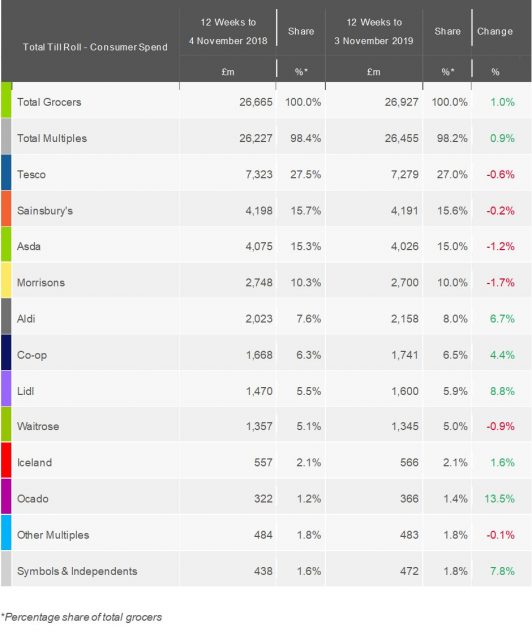Latest grocery market share figures from Kantar covering the 12 weeks to 3 November show sales at Tesco, Sainsbury’s, Asda, and Morrisons were down on last year as the political uncertainty and continued growth of the discounters took its toll.
Overall sales in the supermarket sector grew by just 1% year-on-year, down on the previous periods growth of 1.3%. This was despite an increased focus on promotions and advertising for Halloween and Christmas.
Kantar highlighted that consumer and retailer attention has already turned to preparing for the festive season with £17m spent on mince pies and £3m on Christmas puddings so far. Fraser McKevitt, head of retail and consumer insight, said: “It’s never too early to start thinking about Christmas, particularly for grocery retailers. With many supermarkets already unveiling their festive advertising campaigns, the starting gun has been fired on the race to be Christmas number one.”
Slowing growth in the overall market meant the four largest retailers struggled to make gains. Sales at Asda and Morrisons fell by 1.2% and 1.7% respectively, while Sainsbury’s and Tesco proved slightly more resilient.
McKevitt commented: “After a positive month last time around, Sainsbury’s sales were down by 0.2% in the past 12 weeks, with its market share falling back slightly to 15.6%. Meanwhile, Tesco saw sales fall by 0.6%. The UK’s largest supermarket recently unveiled its new ‘Clubcard Plus’ offer which gives subscribers 10% off two large shops each month. Some 1.8 million households made at least two trips to the retailer worth £50 or more in the past four weeks, a number Tesco will be looking to boost through its latest initiative.”
Lidl, which looks set to ramp up its store opening programme, was the fastest growing bricks & mortar retailer this period with sales increasing by 8.8%. Kantar highlighted that the discounter has made a concerted push to encourage larger trips this year, and its vouchering scheme helped to boost several ‘big shop’ categories, including alcohol where sales rose by 18%.
Aldi also won market share, with sales growth of 6.7% and now accounts for 8% of grocery sales. It boasted the fastest growing premium own label line in the market – its ‘Specially Selected’ range grew by 17.2%.
Meanwhile, the Co-op has now grown continuously since May 2018 after its sales increased again this period, up 4.4%. McKevitt said: “Co-op welcomed an additional 274,000 shoppers through its doors in the past 12 weeks – fruit and vegetables proved particularly popular as fresh produce sales increased by 10%. The retailer stayed true to its convenience-focused roots as chilled items like pizza grew by 8%, helping to increase its market share to 6.5%.”
Elsewhere, Waitrose sales declined by 0.9%, taking its market share to 5.0%. Ocado was again the fastest growing grocer, with its sales up by 13.5%.

NAM Implications:
- Key is how your sales to the mults performed in this period…
- …and obviously a need to build on your successes.
- The future in unprecedented times is probably more about optimising your niche potential…
- …rather than trying to buck national trends…




